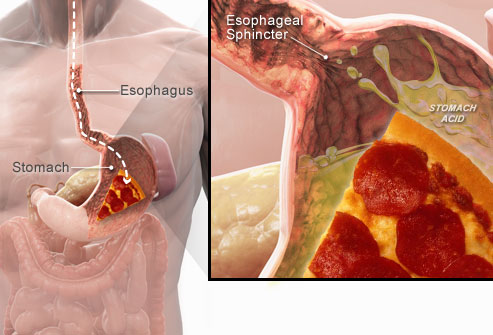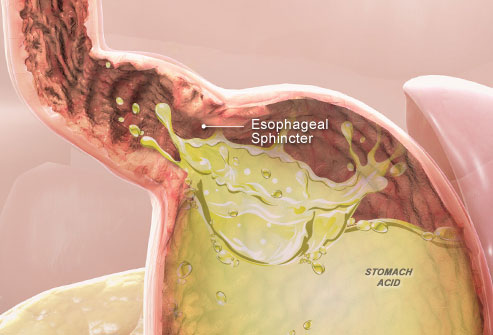
DOCUMENTS | Medicine Documents
Understanding Heartburn
Take a bite of warm, gooey pepperoni pizza, and your digestive system kicks into action. Acids tumble into the stomach, ready to break down your meal. In many people, a faulty valve-like structure lets these acids run amok, triggering a burning sensation in the chest. Heartburn is an extremely common symptom. More than 60 million Americans have heartburn at least once a month. The following slides examine where heartburn starts, and how it can be stopped.
To understand what causes heartburn, let's trace the path of that pepperoni pizza. Once you swallow a bite, it travels through the esophagus to the stomach. A valve-like ring of muscle called the lower esophageal sphincter opens to let the food in. Then it's supposed to close again to prevent stomach acids from sliding up into the esophagus.
In some people, the sphincter between the stomach and esophagus doesn't work as well as it should. This allows acid to seep into the esophagus (called acid reflux), where it can cause pain and irritation. Not everyone with acid reflux suffers from heartburn, and some people with "heartburn" symptoms don't actually have acid reflux but may have some other condition causing this pain.



GERD (Acid Reflux) Symptoms
The hallmark of acid reflux is heartburn -- a painful burning sensation in the middle of the chest. Heartburn typically strikes after meals and can last several hours. The discomfort may be worse after bending over or lying down. Other symptoms of severe acid reflux include a sour-tasting fluid in the back of the throat, difficulty swallowing, or feeling that food is stuck in the chest or throat. A chronic cough or asthma attacks can also be caused by acid reflux. A description of heartburn symptoms is usually all that’s needed to diagnose acid reflux.
Is it GERD?
Heartburn usually doesn't pose a serious threat to your health. However, complications can occur with severe, frequent, and persistent acid reflux. If you have severe heartburn or heartburn two or more times a week, you may have a condition called GERD (gastroesophageal reflux disease) and you should see your doctor. Without treatment, chronic GERD can cause inflammation, ulcers, and scarring. GERD can also lead to changes in the cells lining the esophagus. Known as Barrett's esophagus (shown here), these changes raise the risk of esophageal cancer.
Heartburn: Who’s at Risk?
Anyone can develop heartburn, but certain lifestyle factors affect how well the sphincter works, as well as the amount of acid produced by the stomach. People who are overweight, eat large meals, wear tight-fitting clothes, or smoke tend to be more vulnerable.
Nguồn webMD


